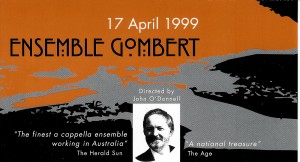Saturday, 17 April 1999, 8 pm
St John’s Anglican Church, Sorrento
Sorrento Subscription Concerts (Oz Classique Concerts)
Tuesday, 20 April 1999, 8 pm
Xavier College Chapel, Kew.
Subscription Concert 1
PROGRAM
Robert Wylkinson Salve regina
John Taverner Missa Corona spinea
Thomas Tallis Miserere nostri, Domine
Christopher Tye Omnes gentes plaudite
Robert White Miserere nostri, Domine
Osbert Parsley Conserva me, Domine
William Byrd Quomoda cantabimus?
| SOPRANO | ALTO | TENOR | BASS |
| Deborah Summerbell | Jenny George | Peter Campbell | James Scott |
| Carol Veldhoven | Margaret Arnold | Peter Neustupny | Philip Nicholls |
| Margaret Pearce | Jennifer Mathers | Stuart Tennant | Andrew Fysh |
| Claerwen Jones | Barbara Tattam | Frank Prain | Grantley McDonald |
| Maria Pisani | Jerzy Kozlowski | ||
| Helen Gagliano |
–
REVIEWS
Friday, 23 April 1999, The Herald Sun [Melbourne], page 78.
Striking a chord
Johanna Selleck
AFTER last year’s perusal of choral treasures from Renaissance Italy, Melbourne’s very own vocal treasure
Ensemble Gombert opened their l999 season in Tudor England.
In Tuesday evening’s celebration of the “glories of English polyphony”, the choir filled the Xavier College
Chapel with that ethereal, floating resonance that is their hallmark.
The elaborate melismas in both Robert Wylkynson’s Salve regina and John Tavener’s Missa Corona spinea
were like luminous golden threads weaving through a rich tapestry of sound.
Ensemble Gombert unravelled them with sensitivity and shapeliness.
The same works present a shining variety of textures and vocal combinations, however the sparser moments
entail hidden traps, often leaving the individual parts unsympathetically exposed.
Occasionally the upper voices did not achieve the pure, uncontaminated amalgam that they so often do.
At times the mix would also have benefited from a more solid presence from the tenors.
After interval Thomas Tallis’ seven-part canon Miserere nostri, Domine and Christopher Tye’s five-part motet
Omnes gentes plaudie achieved a crystalline clarity.
The points of imitation were pronounced definitively and likewise in William Byrd’s eight-part motet
Quomodo cantabimus the canonic writing was tightly construed and well balanced.
The program included Conserva me, Domine by the innocuously named Osbert Parsley, and Robert White’s
splendid yet sombre Miserere mei, Deus.
Ensemble Gombert display that rare ability to extract the purest essence from the music they perform, and
strike a common chord (psychologically speaking) in all of us.
This is timeless music, which speaks directly to the soul of humanity.
For this reason, and for the uncompromising, consistently high standard that they deliver, Ensemble Gombert
has built up a loyal and devoted following.
There are four more concerts to go in the series, including “Gombert and his contemporaries”, “Lassus and
his heritage” and “Three high Renaissance requiems”.

